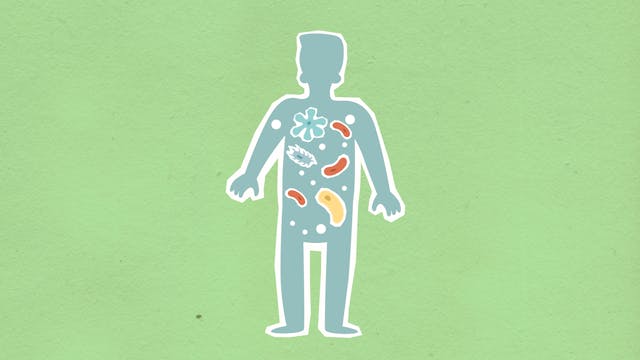For good reason, the term “gut health” has gained popularity in the wellness sector. Digestion, immunity, mood, and even weight management are all significantly impacted by gut health. Experts are recognizing the importance of the microbiome—the trillions of bacteria, viruses, and fungi in your digestive system—for general health as science continues to learn more about it.
This post will discuss the significance of gut health, how it impacts your overall well-being, and doable strategies to enhance it through dietary and lifestyle modifications.
Why Gut Health is Crucial for Overall Wellness
With good reason, the gut is frequently referred to as the “second brain.” Numerous vital processes, such as immune system regulation, nutrient absorption, and digestion, are centered there. However, recent research indicates that the state of your gut microbiota can also have an impact on your mood, mental health, and even cognitive abilities.
A balanced microbiome helps:
-
Support digestion: A healthy gut breaks down food efficiently, allowing for better absorption of nutrients.
-
Boost immunity: 70% of the immune system is housed in the gut, so a thriving microbiome can help fight infections and diseases.
-
Regulate weight: Gut bacteria play a role in how the body stores fat and regulates blood sugar.
-
Enhance mental health: The gut-brain axis connects your digestive system to the brain, influencing mood and emotional well-being.
The Gut-Brain Connection: How Your Microbiome Affects Mood and Mental Health
Did you know that 90% of the “feel-good” neurotransmitter serotonin is produced in your gut? The gut-brain axis is a strong link between the gut and the brain. Scientists have found that stress, anxiety, and depression can all be prevented or managed with a healthy microbiome.
For instance, disorders like leaky gut, which permit toxic substances to enter the bloodstream and cause inflammation, can result from a disruption in the balance of beneficial bacteria in the gut. Mood disorders may result from this inflammation’s impact on brain function.
Best & Worst Foods for Gut Health
What you eat plays a significant role in maintaining a healthy microbiome. Certain foods encourage the growth of beneficial bacteria, while others can contribute to an imbalanced gut. Here’s a breakdown:
Gut-Healthy Foods:
-
Fermented foods: Foods like yogurt, kefir, kimchi, sauerkraut, and miso are rich in probiotics—live bacteria that promote a healthy gut microbiome.
-
High-fiber foods: Whole grains, legumes, fruits, and vegetables provide prebiotics, which are the food that beneficial gut bacteria thrive on.
-
Polyphenol-rich foods: Foods like berries, almonds, and green tea are packed with polyphenols that support gut health by feeding good bacteria.
-
Healthy fats: Omega-3 fatty acids found in flaxseeds, chia seeds, and walnuts can reduce inflammation and promote gut health.
Foods to Avoid for Gut Health:
-
Processed foods: High in sugar and unhealthy fats, processed foods can disrupt the gut microbiome and contribute to inflammation.
-
Artificial sweeteners: Some studies suggest that artificial sweeteners like aspartame can negatively impact gut bacteria, leading to an imbalance.
-
Excessive alcohol: Alcohol can irritate the lining of the gut, leading to leaky gut syndrome and inflammation.
How to Improve Your Gut Microbiome Naturally
Improving your gut health is not only about adding the right foods to your diet but also making lifestyle changes that promote balance in your microbiome. Here are some natural ways to improve gut health:
-
Eat a varied diet: A diverse range of foods can lead to a more diverse microbiome, which is linked to better overall health.
-
Incorporate prebiotics and probiotics: Aim to include both in your diet. Prebiotics (found in foods like garlic, onions, and asparagus) feed good bacteria, while probiotics (found in fermented foods) introduce beneficial bacteria into your gut.
-
Stay hydrated: Drinking plenty of water helps with digestion and the absorption of nutrients.
-
Manage stress: Chronic stress can disrupt the balance of your gut microbiome. Regular relaxation techniques such as yoga, meditation, or deep breathing exercises can reduce stress levels and support gut health.
-
Get enough sleep: Sleep is essential for the body’s repair and regeneration. Poor sleep can harm gut bacteria and lead to digestive problems.
Gut-Friendly Meal Plan for Digestive Wellness
Here’s a sample meal plan to support a healthy gut microbiome. It includes plenty of fiber, probiotics, and gut-friendly foods:
Breakfast:
-
Overnight oats with chia seeds, almond milk, and fresh berries. The oats provide fiber, and chia seeds offer omega-3s, which help reduce inflammation.
Lunch:
-
Quinoa salad with chickpeas, cucumber, and avocado. This meal is packed with fiber and healthy fats, which are good for digestion and gut health.
Dinner:
-
Grilled salmon with steamed broccoli and sweet potato. Salmon is a good source of omega-3s, and broccoli is rich in prebiotic fiber, both of which support the gut microbiome.
Snacks:
-
Kefir smoothie with spinach, banana, and flaxseeds. Kefir contains probiotics, while flaxseeds offer fiber and omega-3s.
FAQs: Common Gut Health Concerns & Solutions
Q: What are the signs of an unhealthy gut?
A: Symptoms of an unhealthy gut may include bloating, diarrhea, constipation, fatigue, skin irritations, and mood swings. If you experience these consistently, it’s essential to consider your diet and lifestyle.
Q: How can I improve my gut health if I have IBS?
A: For those with IBS, a diet rich in fiber, prebiotics, and probiotics can help manage symptoms. Consider working with a dietitian to identify trigger foods and manage your symptoms through dietary adjustments.
Q: Can gut health affect my immunity?
A: Yes! The majority of the body’s immune cells are found in the gut. A healthy gut microbiome supports immune function, helping to protect against infections and diseases.
Q: Is it necessary to take probiotic supplements for gut health?
A: While it’s beneficial to consume probiotic-rich foods like yogurt and kefir, some people may choose to take probiotic supplements to support their gut microbiome. Always consult with a healthcare professional before starting supplements.
Simple Steps to Support Gut Wellness Long-Term
Although it takes time to improve gut health, you can notice notable improvements in your mood, digestion, and general well-being with regular dietary and lifestyle adjustments. Start by increasing your intake of whole, plant-based foods, making drinking water a priority, controlling your stress, and getting enough sleep.
Keep in mind that a happy gut means a happy you!


